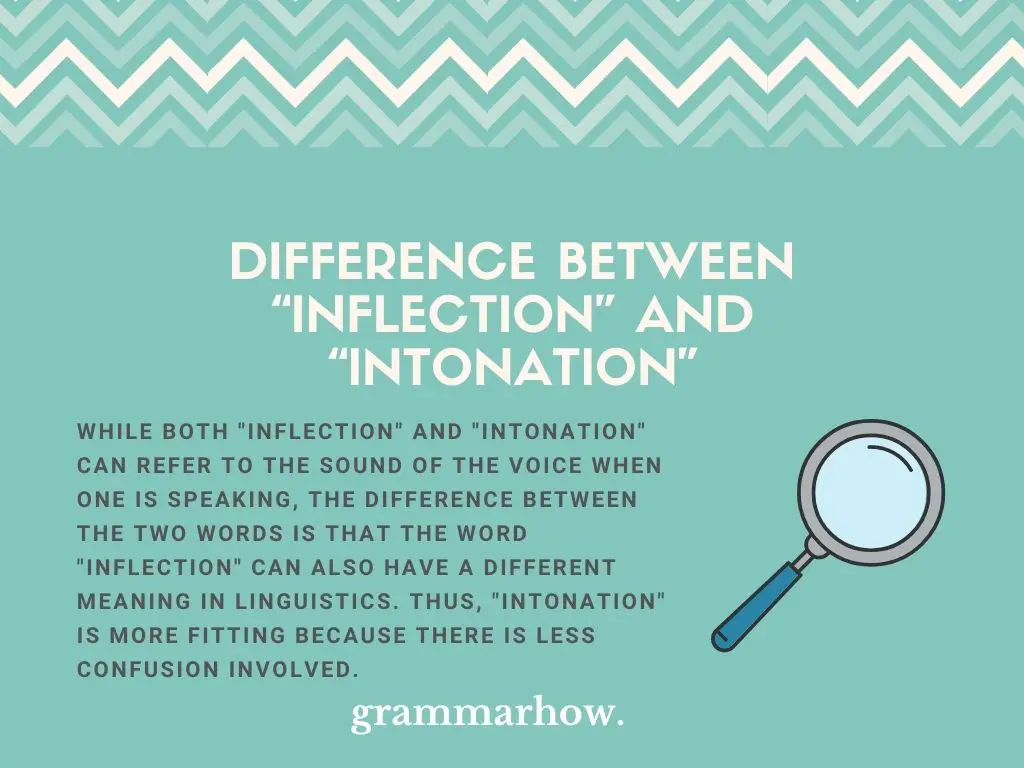The words “inflection” and “intonation” seem to mean the same thing and you can easily confuse one for the other. In this article, we will be exploring the difference between these two words and more.
What Is The Difference Between “Inflection” and “Intonation”?
While both “inflection” and “intonation” can refer to the sound of the voice when one is speaking, the difference between the two words is that the word “inflection” can also have a different meaning in linguistics. Thus, “intonation” is more fitting because there is less confusion involved.

The words “inflection” and “intonation” can both refer to the changes in the sound of one’s voice when speaking. In this regard, they are interchangeable.
Take these two sentences, for example:
- Bella confessed to her crime in a flat, emotionless voice, with no inflection.
- Bella confessed to her crime in a flat, emotionless voice, with no intonation.
As seen above, the words “inflection” and “intonation” both refer to the way Bella confessed to her crime (“in a flat, emotionless voice”).
However, the word “inflection” can also refer to a change in the form of a word, such as adding “-ed” to the word “kick” to make “kicked”. “Intonation”, on the other hand, always refers to sound. Therefore, using “intonation” rather than “inflection” may be more fitting because it leaves less room for confusion.
What Does “Inflection” Mean?
“Inflection” can refer to the ways the sound of your voice changes when speaking. It can also refer to an addition to a word that changes the way it is used in a sentence.
The word “inflection” can have many different definitions. According to the Cambridge Dictionary, it can mean “the ways that the sound of your voice changes when speaking”. This definition is the one that is most similar to that of “intonation”.
Here are examples of “inflection” as defined above:
- The inflection in his mother’s voice just then made him feel that she was angry at him.
- I didn’t speak French, but I could tell he asked me a question based on the inflection in his voice.
- There was no inflection in his voice when he broke up with me, so at first, I thought he was joking.
It can also mean “a change in the form of a word that changes the way it is used in a sentence”. An example of this would be adding “-s” to the word “leg” to make “legs”.
Here are other examples of “inflection” as defined above:
- “Kicked” is the past tense of the word “kick”, with the added inflection “-ed”.
- “Got” is an inflection of the word “get”.
What Does “Intonation” Mean?
In linguistics, “intonation” is characterized by the rise and fall of one’s voice when speaking and how this sound changes the meaning of what is said.
According to the Cambridge Dictionary, the word “intonation” is defined in the field of linguistics as “the sound changes that are produced when one’s voice rises and falls when speaking, especially when this changes the meaning of what is said”.
It is also a term used in music to describe the sound of an instrument or one’s voice.
Here are examples of “intonation” used in a sentence:
- She sounded sure of her answer, as she ended her statement in a falling intonation.
- Based on her intonation, I could tell she was still holding a grudge over what happened this morning.
- He didn’t speak German, but he understood that I asked a question because of the rising intonation.
- The viola player had good intonation.
Is “Inflection” and “Tone” The Same?
No, “inflection” and “tone” are not the same. While “inflection” can refer to the changes in the sound of one’s voice when speaking, “tone” refers to how one communicates his/her words. However, both are used interchangeably in casual conversation.
The word “inflection” can mean either of two things: (1) the rise and fall of one’s voice when speaking, or (2) a change in the form of a word that changes the way it’s used in a sentence.
“Tone” on the other hand, also has several definitions. The one that is most similar to “inflection” is as follows: “a quality in the voice that expresses the way one feels”.
The two are similar and even used interchangeably in casual conversation. However, it seems that “inflection” focuses more on the way the voice shifts when speaking, while “tone” focuses more on the overall sound and emotion in the voice.
“Inflection” – Synonyms
Here are some synonyms of the word “inflection”:
- intonation
- lilt
- stress
- drawl
- cadence
“Intonation” – Synonyms
Below are some synonyms of the word “intonation”:
- inflection
- pitch
- tone
- timbre
- cadence

Martin holds a Master’s degree in Finance and International Business. He has six years of experience in professional communication with clients, executives, and colleagues. Furthermore, he has teaching experience from Aarhus University. Martin has been featured as an expert in communication and teaching on Forbes and Shopify. Read more about Martin here.
